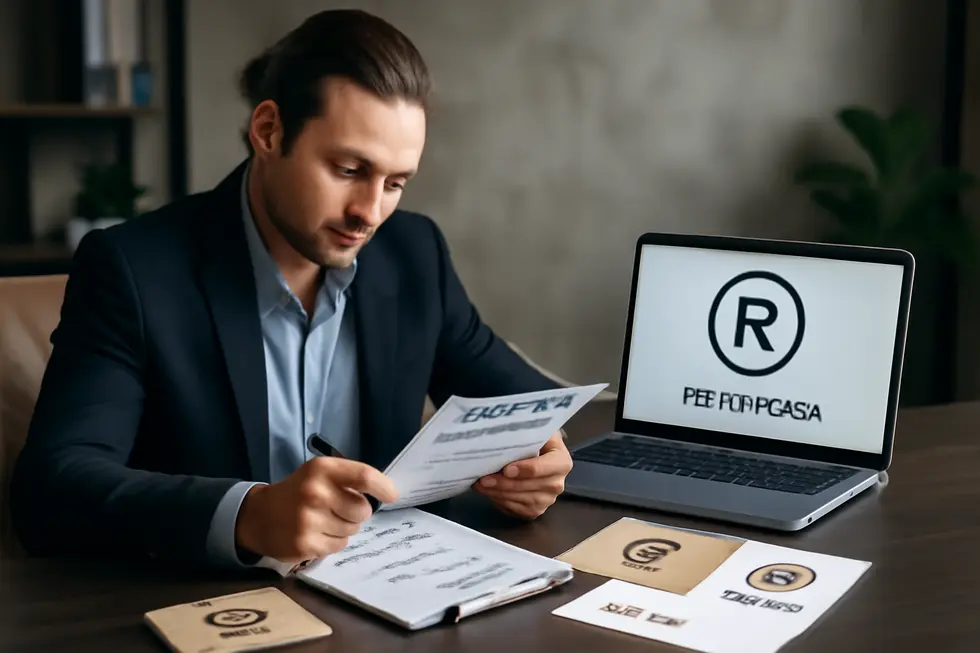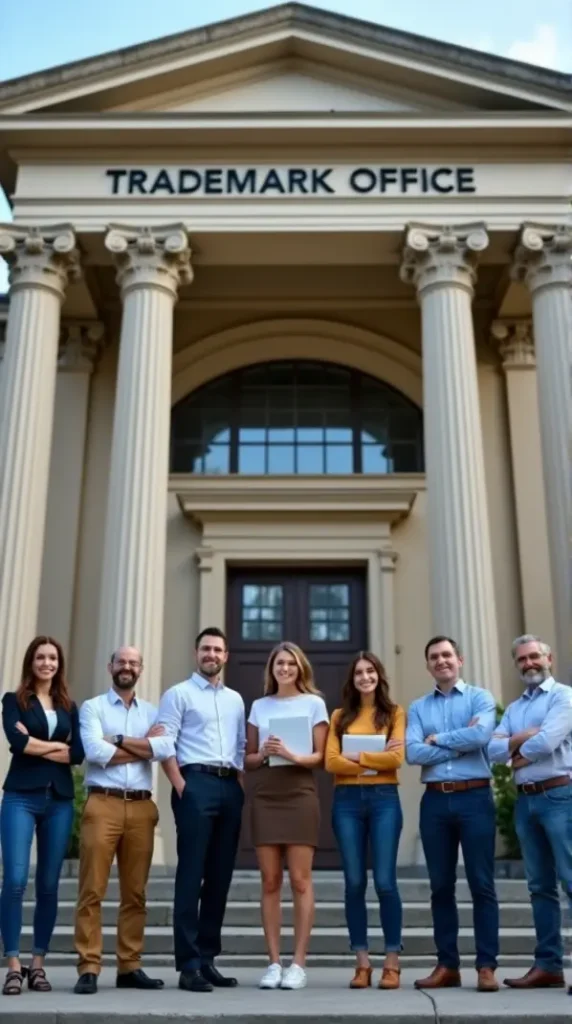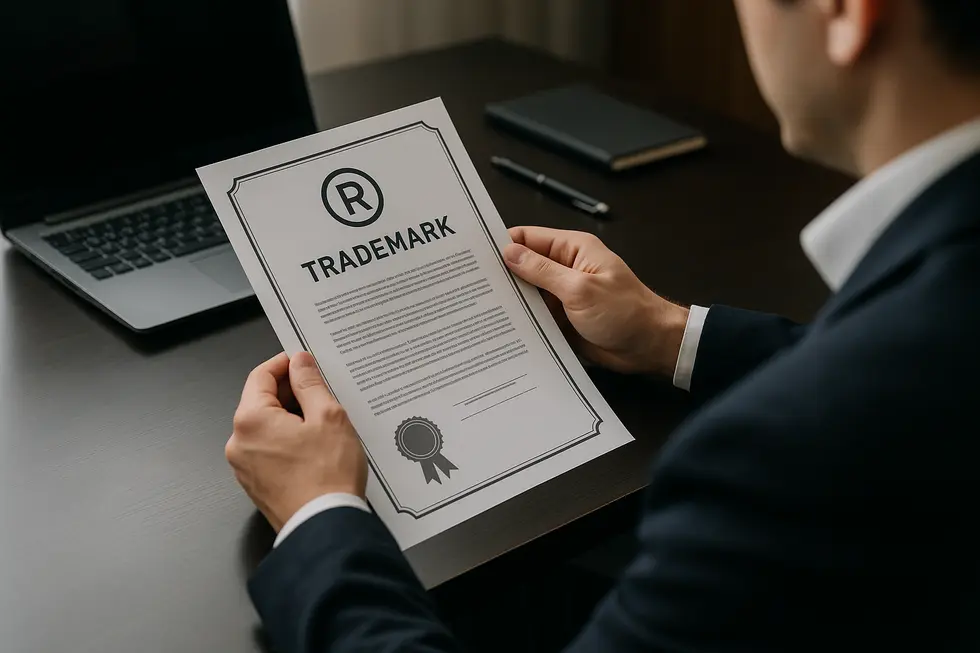Введение
For business owners, securing exclusive rights to a phrase that encapsulates your brand’s identity can feel like an essential step for standing out in the market. However, there’s often confusion around whether phrases can be patented, and if not, what legal protections exist. Understanding the distinction between patents and trademarks is crucial to protect your brand effectively. This discussion unpacks the legal and technical reasons why phrases cannot be patented, explores how trademark protection offers a viable alternative, and clarifies the conditions and limitations you need to be aware of when protecting phrases. Together, these insights empower you to safeguard your brand with greater clarity and confidence.
Оглавление
Chapter 1: Why You Cannot Patent a Phrase: Legal and Technical Limitations
- The Legal Barrier to Patenting Phrases: Abstract Ideas and the Demand for Precision in Patent Claims
- How Patent Law’s Technical Requirements Exclude Mere Phrases from Protection
- Navigating Ambiguity and Legal Boundaries: Why Patent Law Rejects Phrases as Enforceable Claims
Chapter 2: How Can You Patent a Phrase Through Trademark Protection?
- Why Patents Don’t Cover Phrases and How Trademarks Safeguard Your Unique Slogan
- Securing Exclusive Rights: The Essential Trademark Criteria and Application Process for Protecting Phrases
- Securing Exclusive Rights to a Phrase: Navigating Trademark Registration for Brand Protection
Chapter 3: Restrictions and Conditions on Patenting a Phrase: Generic Phrases and Trade Law
- Why Generic Phrases Are Ineligible for Patents: Clarifying Patent Law Boundaries and Public Domain Limits
- When Words Build Brands: Trademark Protections Versus Patent Exclusions for Phrases
- Navigating Public Domain and Fair Competition: Why Generic Phrases Can’t Be Patented
Chapter 1: Why You Cannot Patent a Phrase: Legal and Technical Limitations

1. The Legal Barrier to Patenting Phrases: Abstract Ideas and the Demand for Precision in Patent Claims
Under U.S. patent law, phrases are firmly excluded from patent protection because they are considered abstract ideas rather than inventions. The Supreme Court has consistently ruled that abstract ideas, natural laws, and phenomena do not qualify as patentable subject matter, as patents are intended to protect novel and concrete inventions or technological processes. A phrase, as a linguistic expression devoid of a tangible application or inventive technology, falls squarely into the category of abstract ideas.
This legal exclusion is anchored in the necessity for patent claims to be precise and definitively linked to an inventive concept that transforms an abstract notion into a concrete invention. The Alice/Mayo framework, established through Supreme Court decisions, applies a two-step test: first, it determines if a patent claim is directed to an abstract idea; second, it evaluates whether the claim includes additional elements that amount to a substantive inventive contribution. Phrases alone, without inventive application or technological implementation, fail this critical test.
Moreover, patent claims must be drafted with clarity and precision so that those skilled in the relevant art can understand the boundaries of the invention. Attempts to claim broad or ambiguous ideas—such as a phrase—result in indefiniteness, leading to invalid claims. This requirement ensures that patents are granted only for specific, non-obvious innovations, not for generic expressions or mental concepts.
Together, this legal framework serves to preserve the patent system’s fundamental purpose: fostering genuine technological progress rather than granting monopolies over language. While phrases cannot be patented, they may be protectable as trademarks if they serve as unique identifiers for goods or services. To understand more about trademark protection for phrases and brand identifiers, explore this resource on торговая марка торговая марка защита бизнеса.
For a detailed explanation of abstract idea exclusions in patent law, see https://patentpc.com/blog/can-abstract-ideas-be-patented.
2. How Patent Law’s Technical Requirements Exclude Mere Phrases from Protection
Patent law demands far more than simple words or phrases to grant protection. To be patentable, an invention must be described with precision and depth, enabling those skilled in the relevant field to understand and reproduce it. This requirement fundamentally excludes phrases, which by nature lack technical substance or explanatory detail. Patent claims must have a clear structure—typically starting with a preamble, followed by a transitional phrase like “comprising” or “consisting of,” and concluding with the body that lists concrete elements or steps of the invention. These parts work cohesively to define the invention’s scope clearly and legally. Phrases alone cannot fit into this format because they do not specify any functional or structural characteristics; they simply exist as intangible language without a technical framework.
Moreover, patent examiners scrutinize claim language with exacting standards. Words must be used consistently, and the scope must not be vague or ambiguous. Overly broad terms or empty phrases fail this test and invite rejection or invalidation. Unlike a technical invention that can be physically described or algorithmically explained, a phrase does not illustrate how to make or use something new and useful. This absence of enabling disclosure and definitional clarity disqualifies phrases from patent protection.
These drafting conventions reflect the fundamental purpose of patents—to protect inventions as tangible innovations, not abstract words. Therefore, no matter how original or catchy a phrase may be, it cannot satisfy the legal and technical criteria embodied in patent claims. Instead, phrases find their protection within trademark law’s scope, which safeguards distinctive branding rather than inventions. For comprehensive insights on trademark eligibility related to brand identifiers, refer to this resource on what can you trademark.
3. Navigating Ambiguity and Legal Boundaries: Why Patent Law Rejects Phrases as Enforceable Claims
Patent law requires claims to define inventions with precision and clarity, setting clear boundaries for what is protected. A phrase, by nature, lacks the specificity to meet these strict criteria, resulting in interpretative challenges that prevent its patentability. The legal mandate under 35 U.S.C. 112(b) demands claims to “particularly point out and distinctly claim the invention,” yet a mere phrase cannot disclose the technical or functional aspects necessary to satisfy this requirement. Without clear parameters, patent claims become ambiguous, making enforcement and infringement determination impossible.
Moreover, phrases do not inherently describe any concrete technical features or functional limitations. Patent claims that are overly broad or vague tend to be rejected or narrowly interpreted by courts, undermining their legal strength. Since phrases are abstract linguistic expressions without practical utility or inventive steps, they fall outside patentable subject matter, which expressly excludes abstract ideas and natural phenomena.
Drafting patent claims is a delicate balance: overly restrictive wording can unduly limit protection, whereas vague terms fail the definiteness test. This balancing act is impossible for phrases, which neither specify technological innovation nor convey operational mechanisms. Consequently, patent law’s scope limitations and legal standards ensure phrases remain outside patent eligibility to preserve certainty and enforceability in innovation protection.
For a deeper understanding of how clear and precise language impacts patent claim drafting, see this insightful discussion on the importance of clear and precise language in patent drafting.
Chapter 2: How Can You Patent a Phrase Through Trademark Protection?
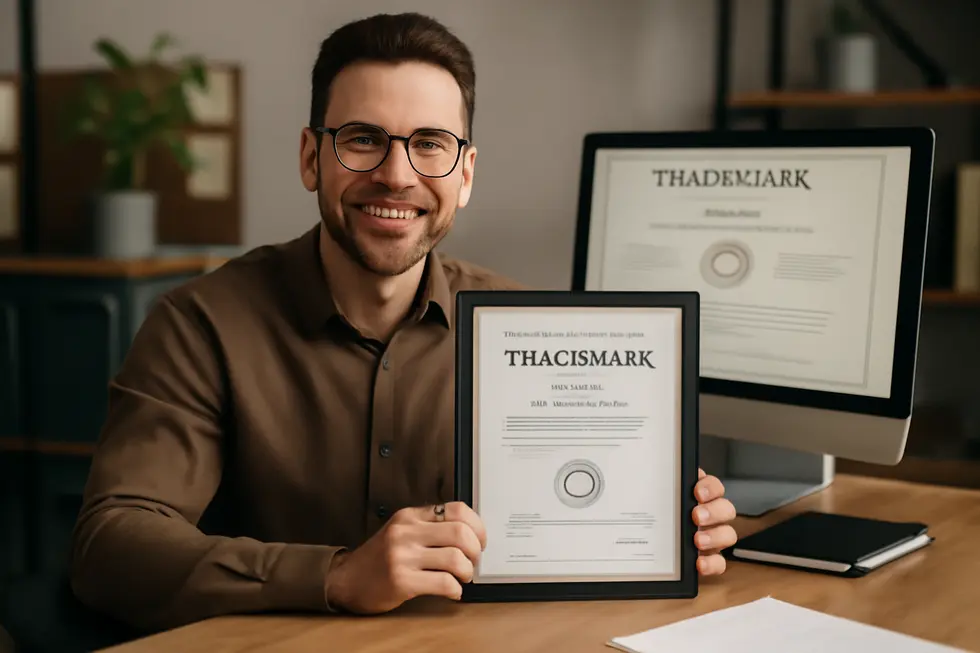
1. Why Patents Don’t Cover Phrases and How Trademarks Safeguard Your Unique Slogan
Understanding the fundamental difference between patents and trademarks is essential when seeking to protect a phrase. Patents are designed to protect inventions—new machines, processes, or designs—granting inventors exclusive rights to make, use, or sell their creation typically for 20 years. Phrases, slogans, or words, however, do not qualify as inventions because they lack the technical or functional innovation required for patent protection.
Instead, phrases can be protected through trademark law. Trademarks safeguard distinctive brand identifiers such as names, logos, and slogans that distinguish goods or services in commerce. To qualify for trademark protection, a phrase must serve as a unique identifier of a business or product and cannot be generic or commonly used. This prevents unfair restrictions on everyday language, maintaining free competition and communication.
Trademark rights usually begin through actual use of the phrase in commerce rather than solely registration. Over time, consistent use and consumer recognition establish common law protections. Although trademark registration with government offices, like the USPTO, is not mandatory, it provides stronger legal defense and presumptive nationwide rights.
For example, well-known slogans become trademarked because they distinctly link a phrase to a specific source. Without trademark protection, others could freely use similar phrases, diluting brand identity. This legal framework enables businesses to protect the value embedded in a phrase acting as a brand’s signature.
In summary, while you cannot patent a phrase, trademark law offers a viable and effective alternative to protect your unique slogans and catchphrases. To explore more about legally securing your brand elements, reviewing insights on охраняемые законом товарные знаки can be highly beneficial. For a deeper legal explanation, see what can you trademark.
2. Securing Exclusive Rights: The Essential Trademark Criteria and Application Process for Protecting Phrases
While you cannot patent a phrase, trademark protection offers a viable path to secure exclusive rights for a phrase used as a distinctive brand identifier. The key to trademarking a phrase lies in its ability to uniquely identify the source of goods or services. To qualify, the phrase must be inherently distinctive rather than generic or merely descriptive, ensuring it stands out as a unique emblem of your brand rather than a common expression. For example, a phrase that simply describes the product’s function or quality cannot be registered as a trademark.
The phrase must also avoid being misleading or deceptive about the nature of the products or services it represents, as this can undermine its eligibility for protection. Furthermore, it cannot be confusingly similar to existing registered trademarks within the same category of goods or services. The United States Patent and Trademark Office (USPTO) rigorously evaluates applications to prevent conflicts that could cause consumer confusion.
Trademark registration requires the phrase to be actively used in commerce as a brand identifier, rather than as a generic description. This usage must be clearly demonstrated during the application process. Protecting your phrase grants you the exclusive right to use it in connection with your goods or services, effectively preventing competitors from leveraging the phrase in a way that misleads consumers about the origin of the products.
The application timeline typically spans 10 to 16 months, beginning with a comprehensive search to avoid conflicts, followed by submission to the USPTO. After examination, the phrase is published for opposition, giving others a chance to contest the registration. Absent any valid objections, registration is granted, allowing you to use the ® symbol to signify official trademark status. Until then, TM or SM symbols indicate an unregistered mark.
Trademark protection does not confer absolute ownership of a phrase in all contexts; fair or descriptive uses outside the brand context remain permissible. The USPTO’s Trademark Electronic Application System (TEAS) facilitates the filing and management of trademark applications for those seeking to protect their unique phrases. For further insights on trademark eligibility and benefits, consider exploring detailed resources on охраняемые законом товарные знаки.
More detailed guidance on trademark registration is available at the USPTO’s official site: https://www.etblaw.com/what-can-you-trademark/
3. Securing Exclusive Rights to a Phrase: Navigating Trademark Registration for Brand Protection
While phrases cannot be patented due to patent law’s focus on inventions, securing exclusive rights to a phrase as a brand identifier is possible through trademark registration. Trademark law is designed to protect words, slogans, or catchphrases that uniquely represent goods or services in commerce. To successfully trademark a phrase, it must be distinctive rather than generic or commonly used within your industry. This distinctiveness enables the phrase to serve as an identifier that consumers associate with a particular source.
The process begins with a thorough search to ensure no existing trademarks conflict with the desired phrase. This step helps avoid infringement and eases the registration path. Next, the particular goods or services the phrase will represent must be identified clearly because trademarks are registered within specified classifications that correspond to business activities.
Filing an application with the appropriate authority involves submitting the phrase, the related goods or services, and evidence of its use or an intent to use it in commerce. Application fees vary based on the number of classes covered. After filing, the application undergoes examination and potential public opposition, where objections can be raised. Addressing these promptly is crucial for approval.
Once registered, maintaining trademark rights requires ongoing commercial use of the phrase and vigilance against unauthorized usage to preserve exclusivity. Registration strengthens legal protections, making enforcement more effective compared to common law rights alone. Given the nuances involved—especially with phrases that sit close to the edges of distinctiveness—consulting an intellectual property attorney can provide valuable guidance and help prevent costly mistakes.
Ultimately, trademark registration offers the practical legal framework to protect a phrase as a unique brand signifier, allowing businesses to build and defend their identity in the marketplace.
For more on trademark eligibility and registration, see this detailed guide on what can be trademarked: https://www.etblaw.com/what-can-you-trademark/. You may also explore strategies for effective brand protection in business at торговая марка торговая марка защита бизнеса.
Chapter 3: Restrictions and Conditions on Patenting a Phrase: Generic Phrases and Trade Law
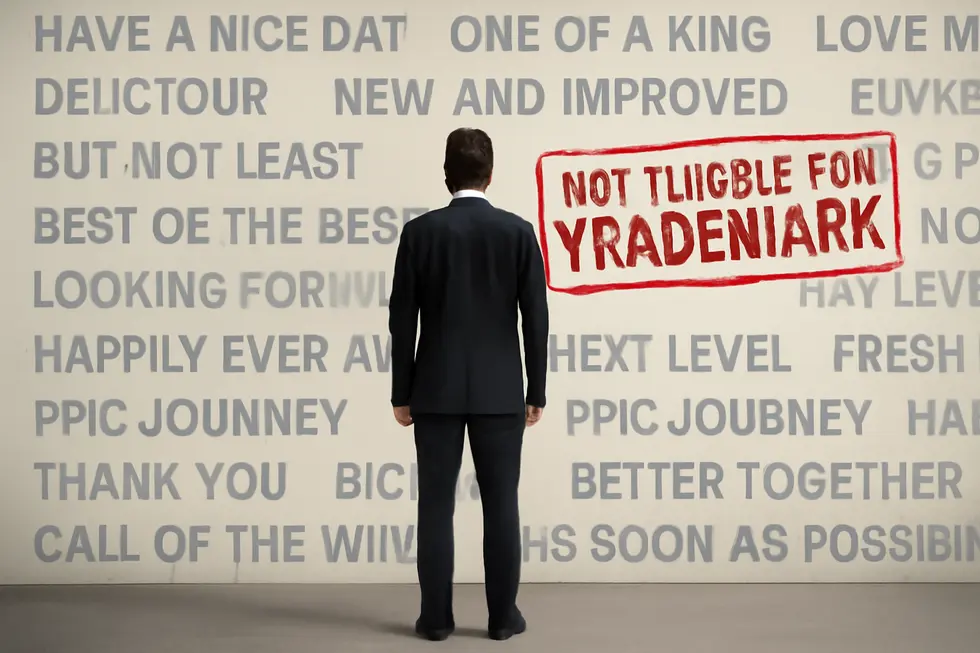
1. Why Generic Phrases Are Ineligible for Patents: Clarifying Patent Law Boundaries and Public Domain Limits
Why Generic Phrases Are Ineligible for Patents: Clarifying Patent Law Boundaries and Public Domain Limits
Patent law fundamentally requires that a claimed invention must demonstrate novelty, usefulness, and a non-obvious inventive step. Generic phrases, being commonplace and widely known, lack these essential qualities. Because phrases by themselves are expressions of language, they do not embody an invention or technical advance subject to patent protection. Instead, patent eligibility demands that the subject matter must be more than abstract ideas or mere words; it must produce a tangible effect or involve a concrete application. Generic or common expressions do not meet this standard, as they belong inherently to the public domain and serve communicative—not inventive—purposes.
Moreover, generic terms are specifically excluded from trademark protection because they merely describe the goods or services involved without distinguishing a source. This principle aligns with patent law’s refusal to grant monopoly rights over language elements, maintaining fair competition and free communication. The law recognizes that allowing exclusive rights over generic phrases would improperly constrain others’ ability to use common terms necessary for everyday language.
This distinction underlines why while inventions like machines or chemical compositions can be patented, simple phrases—even if catchy or potentially valuable—cannot. To protect a phrase as a brand identifier, trademark law applies, provided the phrase is distinctive and associated with particular goods or services. However, the phrase must not be generic or merely descriptive.
For creators seeking to protect inventive concepts beyond language, detailed and technical patent applications remain essential. For more insight on crafting such applications that meet patent criteria, consider reviewing guidance on drafting effective patent applications.
Understanding these boundaries helps clarify why patent law does not extend protection to generic phrases and highlights the complementary role of trademark law in safeguarding distinctive expressions connected to commerce.
2. When Words Build Brands: Trademark Protections Versus Patent Exclusions for Phrases
Patent law explicitly excludes words and phrases from protection since its focus is on inventions and processes that are novel, useful, and non-obvious. Phrases, including slogans and catchphrases, do not meet these criteria and therefore cannot be patented. However, trademark law offers a distinct avenue for protecting phrases, allowing businesses to secure exclusive rights when those phrases serve as unique brand identifiers for their goods or services.
Trademark protection depends on a phrase’s distinctiveness. If a phrase is generic—commonly used within an industry to describe a type of product or service—it cannot be trademarked. This restriction preserves fair competition by preventing any one company from monopolizing everyday language critical to describing products. For instance, a phrase like “Coffee Shop” is too generic to function as a trademark. On the other hand, creatively crafted or unique slogans that clearly identify the source of goods or services can qualify for trademark registration, granting their owners exclusive commercial rights.
Trademark authorities, such as the U.S. Patent and Trademark Office, require a thorough search to ensure that a phrase is neither generic nor confusingly similar to existing trademarks before registration is approved. This scrutiny helps maintain a balanced marketplace where distinctive phrases gain protection without impeding common language use.
Because patents require novelty and utility in inventions, they do not extend to the protection of phrases. Instead, companies should pursue trademarks if their aim is to legally safeguard slogans or catchphrases that symbolize their brand identity. To navigate the complexities of trademark eligibility and avoid common pitfalls associated with genericness refusals, consulting trademark professionals is advisable.
For more insight on protecting distinctive phrases under trademark law, visit what can you trademark. This resource offers practical guidance on how phrase protection differs fundamentally from patents and clarifies the conditions under which trademarks safeguard language tied to commerce.
3. Navigating Public Domain and Fair Competition: Why Generic Phrases Can’t Be Patented
Navigating Public Domain and Fair Competition: Why Generic Phrases Can’t Be Patented
The legal framework surrounding the protection of phrases hinges on fundamental principles of public access and fair competition. Generic phrases, by their very nature, belong to the public domain, meaning they are free for everyone to use without restriction. This public ownership of common language is essential to prevent monopolization and ensure that basic communication remains accessible to all. Patent law, which is designed to safeguard technical inventions meeting criteria such as novelty and non-obviousness, does not and cannot extend to mere words or phrases. Unlike an invention, a phrase lacks the specific, detailed description and concrete innovation required for patent eligibility.
While patent rights grant inventors a limited-time exclusion from others using their invention, this right does not translate to exclusive control over language or ideas that are foundational to everyday commerce. Indeed, patents are recognized as limited public franchises rather than absolute private property, a distinction that allows regulatory control to maintain the public’s interest. This interpretation safeguards the free flow of language necessary for communication and business.
In contrast, trademark law offers a route to protect phrases—but only when they serve as unique identifiers distinguishing one brand from another. Even then, generic terms used descriptively or commonly in trade cannot receive trademark protection, preserving healthy competition and preventing language hoarding. This balanced legal approach protects innovators while leaving generic phrases open to use, maintaining a vital equilibrium in commerce.
For businesses seeking to protect distinctive marks and slogans, understanding the difference between patent and trademark protections is crucial. More details on trademark eligibility and brand protection can be found in the comprehensive guide on business trademark protection.
For a deeper understanding of the public franchise tradition underpinning this balance, see the SSRN paper on Public Franchise Tradition.
Заключительные мысли
Protecting a phrase as part of your brand identity is a strategic move for any business owner, but it is essential to know that patents are not the right tool for this protection. Patents focus solely on new inventions and technological advancements, leaving phrases outside their scope. Instead, trademark law provides a dedicated legal framework to safeguard brand-specific phrases, offering exclusive usage rights when properly registered and used.
However, the process includes important conditions: phrases must be distinctive and non-generic to qualify, and ongoing usage is required to maintain protection. By understanding these distinctions and legal requirements, you can make informed decisions on securing your brand’s identity and preventing others from capitalizing on your creative expressions. Whether creating a new slogan or protecting an existing catchphrase, leveraging trademark law is the most effective approach to protect your phrase in the marketplace.
Получите свой товарный знак сегодня! Тысячи людей защитили свой бренд, подав заявку на товарный знак. А чего ждете вы? Начните подавать заявку на товарный знак!
О нас
The globe’s top website for registering trademarks and safeguarding your brand, name, logo, or slogan. Our platform simplifies the trademark registration process, providing expert guidance and efficient service to help you secure exclusive rights to your business identifiers with confidence and ease.

